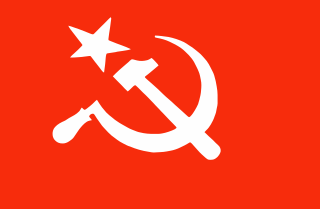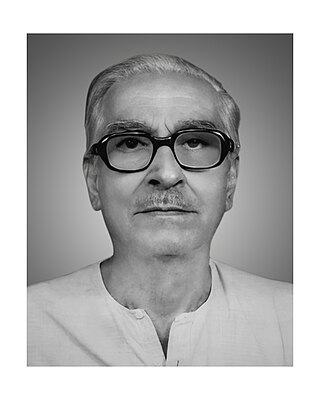Related Research Articles

Biplobi Bangla Congress is a political party in West Bengal, India. The party emerged as a splinter group of Bangla Congress ahead of the 1971 elections of West Bengal. This political Party was founded by Late Sukumar Roy, a prominent Congress leader of Bengal. BBC is now the part of the Left Front.

The Bangla Congress was a regional political party in the Indian state of West Bengal. It was formed through a split in the Indian National Congress in 1966 and later co-governed with the Communist Party of India (Marxist) in two United Front governments, the first lasting from 15 March 1967 to 2 November 1967, the second from 25 February 1969 to 19 March 1970.

Prafulla Chandra Ghosh was the first Premier of West Bengal, India from 15 August 1947 to 14 August 1948. He also served as the Chief Minister of West Bengal in the "Progressive Democratic Alliance Front" government from 2 November 1967 to 20 February 1968.

The Socialist Unity Centre of India (Communist) or SUCI(C) is an anti-revisionist Marxist-Leninist communist party in India. The party was founded by Shibdas Ghosh, Nihar Mukherjee and others in 1948.
Politics in West Bengal is dominated by the following major political parties: the All India Trinamool Congress, the Communist Party of India (Marxist), the Bharatiya Janata Party, and the Indian National Congress. For many decades, the state underwent gruesome and terrible political violence. Since the 2011 West Bengal Legislative Assembly election, it has been governed by the Trinamool Congress party. Previously, it was ruled by Left Front led by the Communist Party of India (Marxist) for over three decades.
The People's United Left Front was an electoral alliance in West Bengal, India, formed in December 1966, ahead of the 1967 West Bengal Legislative Assembly election. The front comprised the Communist Party of India, the Bangla Congress, the All India Forward Bloc and the Bolshevik Party of India. The front won 63 seats out of 280. After the election PULF merged with the United Left Front, forming the United Front. The UF formed a state government, dislodging the Indian National Congress for the first time in the state.
The United Front was a political coalition in West Bengal, India, formed shortly after the 1967 West Bengal Legislative Assembly election. It was conceived on 25 February 1967, through the joining of the United Left Front and the People's United Left Front, along with other parties. Soon after its formation, a massive rally was held in Calcutta, at which an 18-point programme of the Front was presented. Ajoy Mukherjee, leader of the Bangla Congress, was the head of the United Front.
Bangla Jatiya Dal was a political party in West Bengal, India, led by Jahangir Kabir. It was a splinter group of Bharatiya Kranti Dal. Ahead of the 1969 West Bengal legislative assembly election, BJD sought to join the United Front. However, its entry into the United Front was barred by the Bangla Congress. Kabir's brother, Humayun Kabir had been instrumental in bringing down the UF ministry in 1967.

The history of West Bengal began in 1947, when the Hindu-dominated western part of British Bengal Province became the Indian state of West Bengal.
Panskura Paschim Assembly constituency is an assembly constituency in Purba Medinipur district in the Indian state of West Bengal.
Mugberia Assembly constituency was an assembly constituency in Purba Medinipur district in the Indian state of West Bengal.
Jehangir Kabir was an Indian Bengali politician and trade union leader.

The West Bengal Legislative Assembly election, 1967 was held in Indian state of West Bengal in 1967 to elect 280 members to the West Bengal Legislative Assembly. United Front led by Ajoy Mukherjee won majority of seats in the election, and formed first non-Congress government of the state.

Legislative Assembly elections was held in the Indian state of West Bengal on 14 June 1977. The polls took place after the ousting of Indira Gandhi's government at the Centre. The Left Front won a landslide victory. The 1977 election marked the beginning of the 34-year Left Front rule in West Bengal, with Communist Party of India (Marxist) leader Jyoti Basu leading the first Left Front cabinet. The election finally put to rest, the decade-long political instability that had begun since 1967.

Legislative Assembly elections were held in the Indian state of West Bengal in 1987. The election was mainly a clash between the Left Front led by Chief Minister Jyoti Basu and the Indian National Congress(I) led by Prime Minister Rajiv Gandhi. The former held the state government and the latter the national government. The election was won by the Left Front, for the third time in a row.

Legislative Assembly elections were held in the Indian state of West Bengal in 1971. The assembly election was held alongside the 1971 Indian general election.

Legislative Assembly elections were held in the Indian state of West Bengal on March 11, 1972.

Elections were held in Indian state of West Bengal in February 1969 to elect 280 members to the West Bengal Legislative Assembly. United Front formed the government with Ajoy Mukherjee as the Chief Minister. United Front won a landslide 214 seats and 49.7% of the votes.

The 2004 Indian general election were held in Indian state West Bengal in 2004 to elect all 42 seats of Lok Sabha in the state. The election took place on 10 May 2004 and a turnout of 77.7% was recorded.

Jagannath Majumdar (1911–1999) was a Bengali revolutionary, freedom fighter in British India and a political leader after Indian Independence from Nadia, West Bengal. He was a part of the Indian National Congress and was a 3 term member of the West Bengal Legislative Assembly.